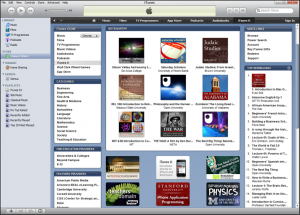by Derek Morrison, 13 October 2009
Here’s an example from the world of podcasts.
WVXU Cincinnati has a weekly programme called Cincinnati Edition with a Focus on Technology item also offered as a podcast.
The 24 August 2008 edition in particular was of note (MP3). Its strapline says “More and more colleges and universities are supplying computerized tools to their students and the on-line community in general. Ann Thompson reports on the latest initiatives”.
I like these short podcasts (~5 minutes) as they make useful initiators for follow-up by other channels or to stimulate parallel lines of inquiry. This particular podcast features some of the work of the University of South Florida who use iTunes U. Other US iTunes U users include: Stanford, UC Berkeley; and MIT.
In the UK HEIs with an iTunes U presence include: the Open University; University of Oxford; UCL; Coventry University; University of Cambridge; University of Warwick;; University of Edinburgh; and Birmingham City University.
But are there any alternatives or supplements to iTunes U? In an earlier Auricle posting Open opportunities, open threats? (30 April 2009) I mentioned the University of London’s Computer Centre’s (ULCC) hosting services for the UK HE sector particularly in regard to Moodle hosting. ULCC also offer a podcasting hosting service for those HEIs wishing to avoid the direct technical or support overhead associated with large scale podcast distribution.
But iTunes U is a popular and free hosting service (currently) because it also offers access control. Consequently, material can be be made available to, say, students on a particular course. But as with all such “free” services it’s probably worth keeping in mind that commercial and economic vagaries and turbulence can lead to, sometimes radical, changes in business models and the services they inform. While “free” services like iTunes U do offer an attractive distribution option for both users and content developers it would probably be pretty unwise for any institution’s open education resource distribution strategy to be dependent on any one such service no matter how “free” it appeared to be at the time. Spreading one’s risks and keeping the digital maxim of “lots of copies keeps stuff safe” would seem wisest. Those contemplating iTunes U as part of their education resources support provision should read this Apple briefing.


